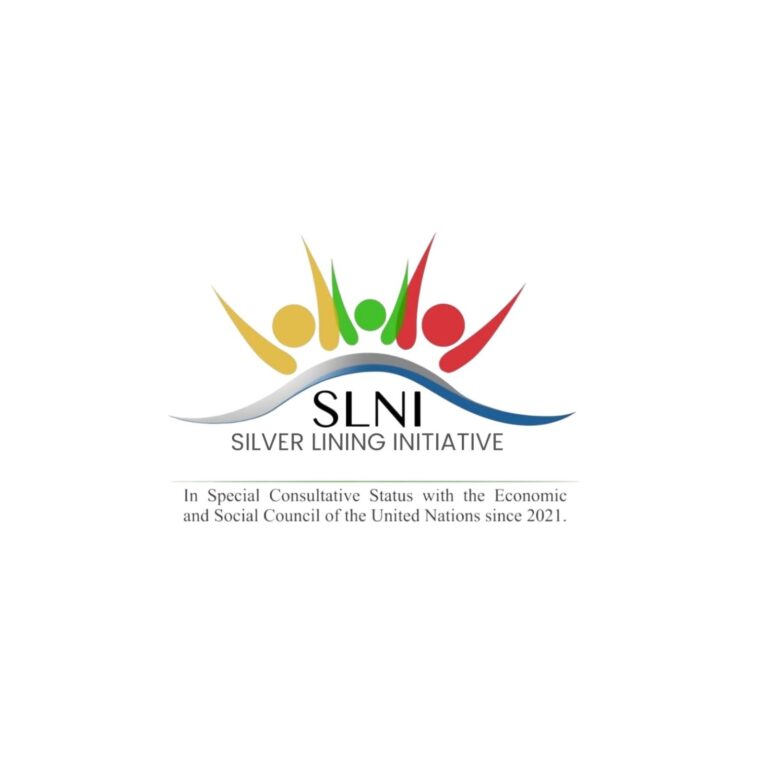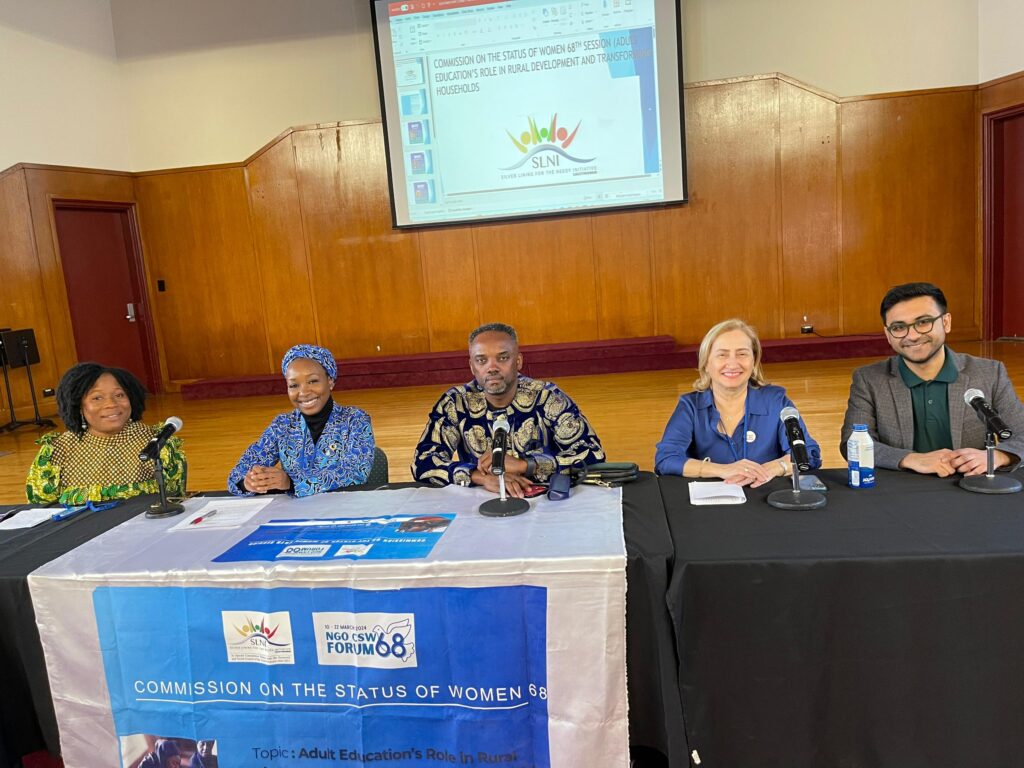This is a demo store for testing purposes — no orders shall be fulfilled. Dismiss

PROGRAMME OVERVIEW
On March 12, 2024, the Silver Lining for the Needy Initiative (SLNI) hosted an in-person parallel event during the 68th annual Commission on the Status of Women (CSW68) in New York City. The CSW68 themes Priority theme: Accelerating the achievement of gender equality and empowering all women and girls by addressing poverty and strengthening institutions and financing with a gender perspective. Review theme: Social protection systems, access to public services, and sustainable infrastructure for gender equality and women’s empowerment. The in-person parallel event, titled “Adult Education’s Role in Rural Development and Transforming Households,” aimed to shed light on the pivotal role of adult education in fostering rural development and empowering households, particularly in the context of gender equality and women’s empowerment.
Moderators: Miss Hauwa Abbas (C. O. O, SLNI) and Mrs. Ajanihu Ngozi Ezeala (POWER Foundation)
KEY DISCUSSIONS
Throughout the event, speakers engaged in thought-provoking discussions, addressing various aspects of adult education’s impact on rural development and household empowerment. Key topics included health literacy, poverty alleviation, women’s empowerment, early forced marriage, mental well-being, education, and financial literacy. Participants actively contributed to the dialogue, sharing insights and experiences from diverse cultural contexts, enriching the exchange of ideas.
SPEAKERS AND TOPICS COVERED
v Dr. Ifeanyi Nsofor – Senior New Voices Fellow, Aspen Institute (Nigeria/USA):
Dr. Nsofor, drawing from his expertise as a public health expert, elucidated on the potential of community-based adult education programs to enhance health literacy and reproductive health awareness, particularly among vulnerable populations. He emphasized the critical role of healthcare professionals in promoting adult literacy to combat issues such as early child marriage and to improve overall health outcomes.
v Ms. Fatma Aytac – Red Pepper Organization/Women’s Party (Turkey):
Ms. Aytac emphasized the importance of adult literacy initiatives in intersecting with poverty alleviation strategies and empowering women. She highlighted the crucial role of grassroots organizations in advocating for policies that combat early child marriage and promote sustainable development within households, emphasizing the need for tailored interventions to address the specific challenges faced by women in rural areas.
v Mr. Tahmid Khan, MPH, CHES – Public Health Researcher, Co-founder of BacharLorai (Canada/NYC):
Mr. Khan, leveraging his expertise in public health, emphasized the impact of adult literacy on mental well-being within households and its role in reducing stigma surrounding mental health issues. He discussed how adult literacy programs can contribute to improving children’s health outcomes in rural areas and boost confidence among women, ultimately supporting youth transformation and community resilience.
v Ms. Hawa Varney – Women in Agriculture for Sustainable Development, Liberia (Liberia):
Ms. Varney underscored the role of adult literacy programs in improving agricultural skills and financial literacy among rural women, thereby empowering them out of poverty. She highlighted how adult literacy contributes to economic independence, addresses factors leading to early child marriage, and enhances the enrollment and educational outcomes of children in rural communities, ultimately fostering sustainable development.
SLNI RECOMMENDATIONS
At the conclusion of the event, SLNI presented recommendations aimed at advancing adult education and empowering rural communities:
1. Community-Led Adult Education Initiatives: SLNI advocates for the development of community-led adult education initiatives, designed in collaboration with local communities to ensure cultural relevance and sustainability. These initiatives should prioritize the inclusion of marginalized groups and address the specific needs of rural populations.
2. Integration of Health and Life Skills Education: SLNI recommends the integration of health and life skills education within adult literacy programs to empower women and girls with practical knowledge and skills essential for their well-being and socio-economic advancement. This holistic approach ensures that adult education programs not only enhance literacy but also contribute to overall health and resilience.
3. Engagement of Local Stakeholders and Partnerships: SLNI emphasizes the importance of engaging local stakeholders, including government agencies, NGOs, educational institutions, and community leaders, in the design and implementation of adult education initiatives. By fostering partnerships and leveraging local resources, these initiatives can maximize their impact on rural development and community transformation, ensuring sustainability and scalability.
REFLECTION AND CONCLUSION
The parallel event hosted by SLNI at CSW68 served as a platform to amplify the importance of adult education in fostering rural development and transforming households, ultimately contributing to gender equality and women’s empowerment on a global scale. The insightful discussions and diverse perspectives shared by the esteemed speakers underscored the urgency of investing in adult education as a catalyst for positive change in rural communities worldwide.
Miss Hauwa Abbas, COO of SLNI, expressed her satisfaction with the event’s success, emphasizing the transformative power of adult education and the positive feedback received from participants. Moving forward, SLNI remains committed to advocating for policies and initiatives that prioritize adult education as a fundamental driver of sustainable development and social justice.
In conclusion, the parallel event hosted by SLNI at CSW68 exemplified the organization’s dedication to advancing gender equality and empowering marginalized communities through education and advocacy. By fostering dialogue, sharing best practices, and mobilizing collective action, SLNI continues to be a catalyst for positive change in the pursuit of a more equitable and inclusive world.




Silver Lining Initiative (SLNI) is an indigenous non-profit Organization established in 2009 to promote the spread of humanitarian aid through its broad spectrum of projects and activities.
+234 807 496 7427
info@slni.org
Maitama, FCT 904101,Abuja
© 2026 Silver Lining Initiative – All rights reserved
This is a demo store for testing purposes — no orders shall be fulfilled. Dismiss